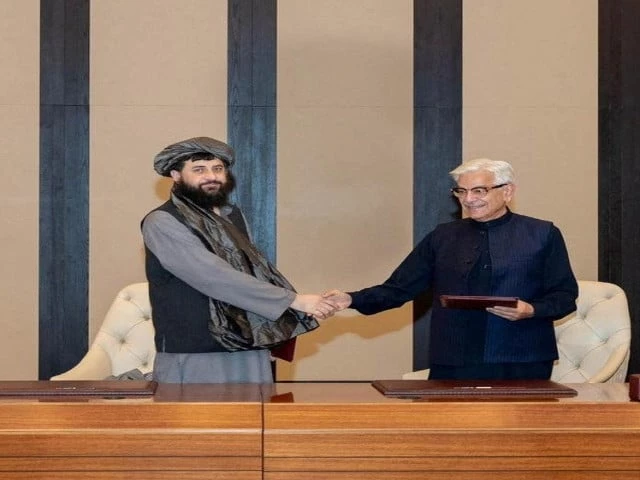Pakistan Warns Ceasefire Not ‘Open’; Terms Istanbul Understanding ‘tentative’ agreement
Defense Minister Khawaja Muhammad Asif and Afghan Defense Minister Mullah Mohammad Yaqoob Mujahid shake hands after signing a ceasefire agreement brokered by Qatar and Turkey in Doha on October 19. Photo: Reuters
ISLAMABAD:
Pakistan may have welcomed the understanding reached with Afghanistan in Istanbul brokered by Türkiye and Qatar, but officials clarified on Friday that the agreement was “tentative” and the ceasefire was neither open nor unconditional.
According to official sources, the main terms of the understanding include that Afghanistan must not allow its territory to be used for attacks against Pakistan; it must take clear, verifiable and effective steps against Fitna al Khwarij (TTP) and other terrorist outfits including Fitna al Hindustan (BLA).
“Credible evidence of action is expected, including dismantling of terrorist hideouts, disruption of logistical channels, arrest or prosecution of leadership and transparent reporting through a monitoring and verification mechanism,” sources said.
Officials stressed that Afghanistan’s failure to provide verifiable evidence, or continued attacks from Afghan soil, would be considered a violation of the ceasefire, and Pakistan reserves all options to protect its sovereignty and its citizens.
Pakistan entered this phase in “good faith” but emphasized that the ceasefire is conditional, with demonstrable responsibility required from the Afghan side.
“Peace is our preference; protection of Pakistan’s territorial integrity is non-negotiable,” the sources said.
Meanwhile, after the Istanbul talks, Foreign Ministry spokesman Tahir Andrabi provided further details during a briefing.
He noted that Pakistan’s delegation engaged with the Afghan Taliban regime without compromising on the stand that Afghan soil must not be used for terrorism against Pakistan.
While significant discussions were underway, the Taliban acknowledged the presence of the TTP and the BLA leadership in their territory and offered explanations for their continued presence.
The spokesperson highlighted that the monitoring and verification mechanism established under the auspices of the brokers will serve as an impartial tool to track compliance. Written guarantees remain part of ongoing discussions, with the next round of talks scheduled for November 6.
He also stressed that local commanders and military authorities along the border would assess any potential ceasefire violations and respond accordingly. Pakistan has maintained multiple channels of engagement, including a 24/7 hotline for refugee-related issues, underscoring the country’s commitment to both peace and protection of its territory.
He also ruled out an immediate reopening of border crossings, saying the current situation does not warrant such a decision.
The border between Pakistan and Afghanistan remained closed for almost three weeks.
The sources said relations with Afghanistan depend on one point – how Kabul effectively and decisively addresses Pakistan’s legitimate security concerns.



